

By John Helmer, Moscow
@bears_with
First, the news from the front as George Eliason reports on his tour this week of the civilian destruction and mass grave sites at Popasnaya, Kremennaya, and Severodonetsk in the Lugansk region. Then from the federal court in Worcester, Massachusetts, a Department of Justice document making fresh revelations in the John Teixeira case that hint at a plea bargain which the US media are covering up. And then from Canada’s west coast, guest Chris “Gorilla Radio” Cook on what the US has already made of Canada, and what will happen when the Ukrainian diaspora faces the capitulation of the regime in Kiev and Lvov.

MAP OF WESTERN LUGANSK REGION
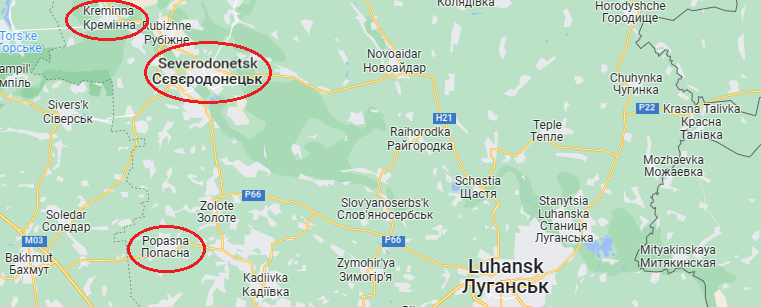
On Thursday, in federal court in Worcester, Massachusetts, John Teixeira, accused of leaking the Pentagon Papers, appeared for a 90-minute bail hearing before Magistrate Judge David Hennessy.
The New York Times, which sent reporters to the courtroom, described it as “tense”, and quoted Teixeira’s lawyer from the Boston public defender’s office as saying Teixeira “never intended to disseminate any information to the news media or the nation’s adversaries”. This isn’t the formal courtroom plea yet, not least because the defence attorneys haven’t been able to evaluate all the evidence, and because the government’s lawyers are still adding to the charges.
The new paper filed in court by the Department of Justice’s National Security Division and US Attorneys in Boston have added to the original Espionage Act charge the new and lesser charge of unauthorized removal or retention of classified documents. This is a hint that the government prosecutors realize the espionage case against Teixeira is faulty, and that Pentagon and US Air Force (USAF) officials may be vulnerable themselves. The newspaper, which first revealed the leaks in print, did not print the text of the Justice Department’s new court filing or notice the shift in the prosecution’s case.
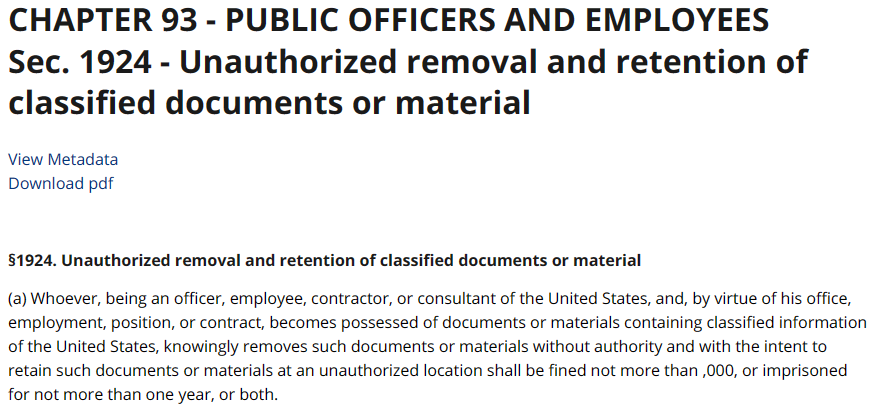
Source: https://law.justia.com/
Teixeira’s defence to the espionage indictment – the law was enacted between 1946 and 1986 and carries a 10-year prison term on conviction — will not only argue lack of intention to harm US security or aid a US adversary; there may also be evidence of entrapment by higher ranking officers who made Teixeira’s access possible after the early discovery of his posting of personal summaries and interpretations.
Teixeira’s defence against the Section 1924 office of “unauthorized removal” – first enacted in 1994 and carrying a maximum 12-month prison sentence — will require evidence from the defence lawyers that US intelligence monitors and Pentagon security knew what Teixeira was doing very early in his leaking process, which began in February 2022, fourteen months before his arrest.
Judge Hennessy hinted that evidence on this issue is bound to come up when the trial commences in open court. According to Hennessy, he didn’t believe Teixeira’s lawyer who testified there had been no intention to allow the circulation of the classified documents beyond a small group on the internet. Implying the social media are closely monitored by foreign services, Hennessy said: “Somebody under the age of 30 has no idea that when they put something on the internet that it could end up anywhere in this world? Seriously?”
“The defendant put top-secret information on the internet, and your argument is that he had no idea that it would go anywhere beyond the server…I find it a little incredible that the defendant could not foresee that possibility.”
The same skepticism that US and British signals monitoring services could have failed to detect what Teixeira was doing is widespread in the alternative media. The New York Times and Washington Post have ignored it.
Fortune has reported that evidence available to the defence lawyers will come from the USAF. “The Air Force’s investigation will probably discover whether a referral was generated — and whether security officers did anything with the information.”
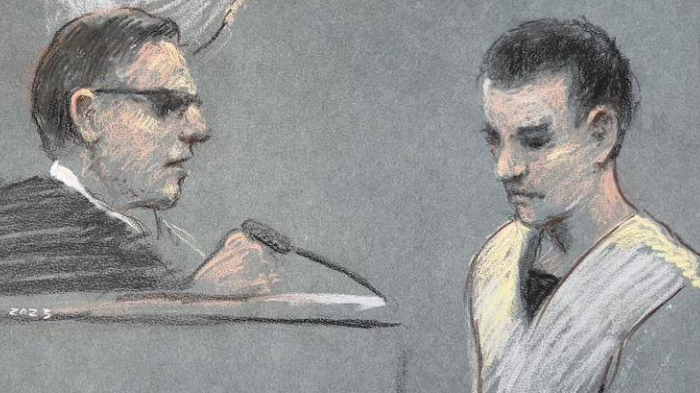
Courtroom sketch of Judge Magistrate David Hennessy and John Teixeira.
The shift in the legal grounds of the case from Section 793 to Section 1924 does more than change the evidence required for trial and conviction. It also hints at the possibility there will be a plea bargain in which the Justice Department and US attorneys will tell the court that they cannot proceed to an open trial for espionage in order to conserve Pentagon security secrets. In return, Teixeira will plead guilty to the lesser charge with a 12-month sentence, less time served from the date of his arrest on April 9 and including the months of pre-trial detention without bail which Hennessy is likely to order.
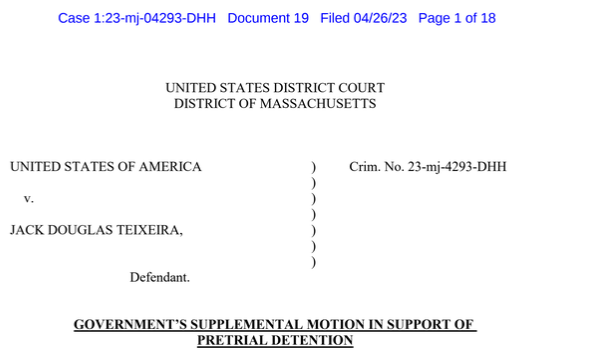
Source: https://www.documentcloud.org
The new prosecution evidence claims that Teixeira “owned multiple guns, including a high-capacity AK-style weapon, [and] had regular discussions about violence and murder on the social media platform.” The FBI search of his bedroom allegedly revealed “handguns, bold-action rifles, shotguns, an AK-style high-capacity weapon, and a gas mask…a bazooka…ammunition and tactical pouches…and what appeared to be a silencer-style accessory…and a military-style helmet with a mounting bracket such as those used for cameras.” The government has put a value of the weapons at $19,000.
Teixeira’s lawyer claimed in court his bedroom guns were fakes — “not real weapons, but replicas known as airsoft guns.”
The government’s evidence in court reveals that “in 2018, while still a teenager, the Defendant applied for a firearms identification card (“FID”). His application was denied due to the concerns of the local police department over the Defendant’s remarks at his high school. The Defendant remained undeterred and applied again in 2019 and 2020. In his 2020 application the Defendant cited his position of trust in the United States as a reason he could be trusted to possess a firearm.”
In other words, the local police rejected Teixeira for a firearms license in 2018 and 2019. He then enlisted in the Air National Guard in September 2019. The following year he applied again to the police, but the government document does not say if that application was successful. If not, the arms Teixeira purchased were fakes, and the only genuine arms found during the FBI searches belonged to his father, Jack Michael Teixeira, and were licensed to him.
The government is also revealing for the first time that “since 2021” Jack Teixeira junior “held a security clearance at the Top Secret/Sensitive Compartmented Information [SCI] level”. He was then promoted “since May 2022” to “E-3/Airman, with the title of Cyber Defense Journeyman”. This means that Teixeira’s secret document access clearance preceded his promotion through the E-1 and E-2 ranks of the Air Force. Each promotion and pay grade increase would have required additional checks; some of them appear to have occurred after “approximately February 2022 [when] the Defendant began to access hundreds of classified documents containing national defense information thast had no bearing on his role as essentially an information technology (“IT”) support specialist. See Attachment D (the Church Audit Declaration).”
The attachments to this court filing remain sealed and secret. They add to the evidence that the Air Force, the Pentagon, and other secret counter-intelligence services knew what Teixeira was doing in violation of the law, but kept reviewing his performance and promoting him.
In the second and third segments of the broadcast, Chris Cook discusses the history of his Gorilla Radio, the leading truth radio in Canada. Originating in Victoria , capital of the province of British Columbia, listen to Gorilla Radio’s latest programmes here and follow the blog. Since October, Gorilla Radio has been banned from broadcasting by Radio CFUV 101.9 FM at the University of Victoria; Simon Fraser University in neighbouring Vancouver continues to broadcast every Monday morning at Radio CJSF 90.1 FM. The Gorilla Radio transcripts are published on the blog. For Chris Cook’s broadcast archive, click to open.
During the discussion the sharp contrast was drawn in the history of Canada’s relations with Russia between the classical pianist Glenn Gould (1932-82) and the likes of Ukrainian-Canadian Chrystia Freeland, deputy prime minister. Between 1956 and 1957 Canadian officials had reservations about allowing Gould to make the first Canadian cultural tour of the Soviet Union with piano performances in Moscow and Leningrad. This film documentary records anxiety in Ottawa that the US government was opposed. Lester Pearson was Canada’s Minister for External Affairs at the time when the US was imposing sanctions following the Soviet Army intervention in Hungary.
Watch this film, Gould’s Moscow and Leningrad performances, and the recollections of Canadians and Russians looking back.
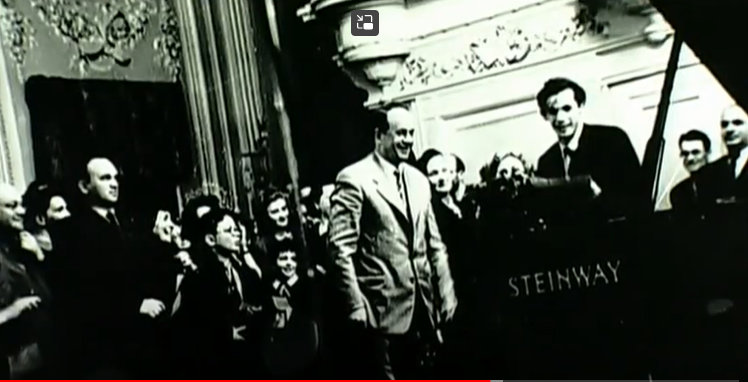
“The impression [in Moscow] was that he was from Mars. An Alien” – Min 15:28. “Now forty-four years later [from the Leningrad concert] I absolutely believe he was an alien. Glenn Gould was a visitor on this earth. People cannot play the piano like that, I can assure you” – Min 30. Source: https://www.youtube.com/











Leave a Reply